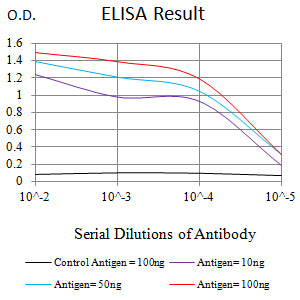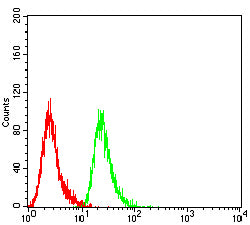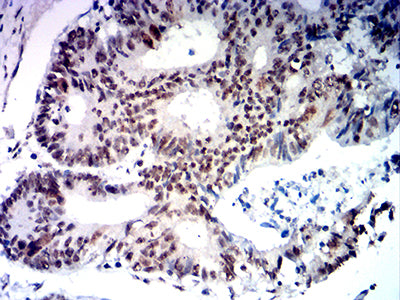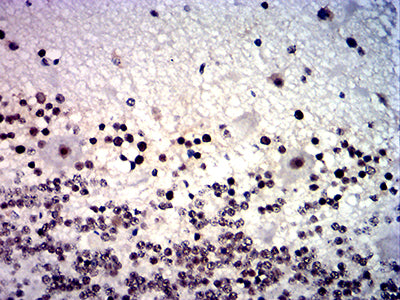



| WB | 咨询技术 | Human,Mouse,Rat |
| IF | 咨询技术 | Human,Mouse,Rat |
| IHC | 1/50-1/200 | Human,Mouse,Rat |
| ICC | 技术咨询 | Human,Mouse,Rat |
| FCM | 咨询技术 | Human,Mouse,Rat |
| Elisa | 1/2000-1/5000 | Human,Mouse,Rat |
| Aliases | NMYC; ODED; MODED; N-myc; bHLHe37 |
| Entrez GeneID | 4613 |
| clone | 2A4E9 |
| WB Predicted band size | 49.5kDa |
| Host/Isotype | Mouse IgG1 |
| Antibody Type | Primary antibody |
| Storage | Store at 4°C short term. Aliquot and store at -20°C long term. Avoid freeze/thaw cycles. |
| Species Reactivity | Human |
| Immunogen | Purified recombinant fragment of human MYCN (AA: 337-464) expressed in E. Coli. |
| Formulation | Purified antibody in PBS with 0.05% sodium azide |
+ +
以下是3篇关于SLC1A5(ASCT2)抗体的参考文献及其摘要概括:
1. **"ASCT2/SLC1A5 antibody inhibits glutamine transport and tumor growth in triple-negative breast cancer"**
- **作者**: van Geldermalsen et al.
- **摘要**: 研究开发了特异性抗ASCT2抗体,证明其通过阻断谷氨酰胺转运抑制三阴性乳腺癌细胞的增殖和肿瘤生长,为靶向代谢治疗提供依据。
2. **"Diagnostic and prognostic value of SLC1A5 immunohistochemistry in gastric cancer"**
- **作者**: Wang et al.
- **摘要**: 利用SLC1A5抗体进行免疫组化分析,发现其在胃癌组织中高表达,且与患者预后不良显著相关,提示其作为潜在生物标志物。
3. **"Neutralizing SLC1A5 monoclonal antibody suppresses colorectal cancer by disrupting mTORC1 signaling"**
- **作者**: Shimizu et al.
- **摘要**: 通过中和性单克隆抗体阻断SLC1A5功能,抑制结直肠癌细胞mTORC1信号通路,降低肿瘤代谢活性并诱导凋亡,为治疗提供新策略。
4. **"Antibody-based targeting of SLC1A5 in melanoma enhances anti-PD-1 therapy efficacy"**
- **作者**: Liu et al.
- **摘要**: 研究结合抗SLC1A5抗体与PD-1抑制剂,显著增强黑色素瘤免疫治疗效果,揭示靶向代谢与免疫联合治疗的潜力。
SLC1A5. also known as ASCT2 (alanine-serine-cysteine transporter 2), is a sodium-dependent neutral amino acid transporter primarily responsible for the uptake of glutamine, alanine, serine, and other small neutral amino acids. It belongs to the solute carrier family 1 (SLC1) and plays a critical role in cellular metabolism, particularly in cancer cells that rely on glutamine for energy production and biosynthesis (a phenomenon termed "glutamine addiction"). SLC1A5 is overexpressed in various malignancies, including breast, lung, and colorectal cancers, making it a potential biomarker and therapeutic target.
Antibodies targeting SLC1A5 are widely used in research to study its expression, localization, and function in normal and pathological conditions. These antibodies enable detection via techniques like Western blotting, immunohistochemistry (IHC), and immunofluorescence (IF), helping to correlate SLC1A5 levels with tumor progression, metabolic reprogramming, and patient prognosis. Additionally, SLC1A5-blocking antibodies are being explored in preclinical studies to inhibit glutamine uptake, thereby starving cancer cells of nutrients and suppressing tumor growth. Challenges in antibody development include ensuring specificity due to structural similarities among SLC transporters. Recent studies also investigate its role in viral entry (e.g., as a receptor for some retroviruses), broadening its biomedical relevance.
×